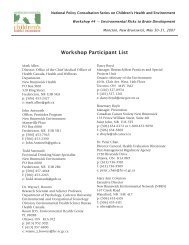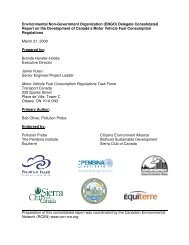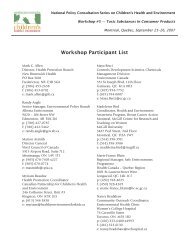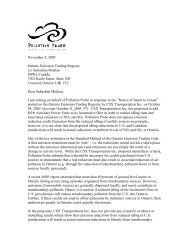Primer on Bioproducts - BIOCAP Canada
Primer on Bioproducts - BIOCAP Canada
Primer on Bioproducts - BIOCAP Canada
You also want an ePaper? Increase the reach of your titles
YUMPU automatically turns print PDFs into web optimized ePapers that Google loves.
manufacturing. The group is, however, opposed to any “out-ofdoorsapplicati<strong>on</strong>s,” arguing that the modified genes of fastgrowingtrees and disease-resistant crops may have adverseimpacts <strong>on</strong> natural ecosystems and could escape to becomeincorporated in the genomes of related plants.The Sierra Club of <strong>Canada</strong> argues that the c<strong>on</strong>flict of interestinherent in government agencies that both promotebiotechnology (e.g., Industry <strong>Canada</strong>, Natural Resources <strong>Canada</strong>)and regulate biotechnology (e.g., Health <strong>Canada</strong> and the CanadianFood Inspecti<strong>on</strong> Agency) is another reas<strong>on</strong> to c<strong>on</strong>sider thetechnology to be inherently risky to the envir<strong>on</strong>ment and health.Reports issued by the Royal Society of <strong>Canada</strong> and the OntarioPublic Health Associati<strong>on</strong> in 2001 also criticized thebiotechnology regulatory system in <strong>Canada</strong> as being inadequateto deal with many of the scientific, social and ethical issuesassociated with genetically modified organisms. The Governmentof <strong>Canada</strong> has developed an acti<strong>on</strong> plan to address therecommendati<strong>on</strong>s in the Royal Society Report and has committedto producing reports <strong>on</strong> the progress of the acti<strong>on</strong> plan (www.hcsc.gc.ca/english/protecti<strong>on</strong>/novel_foods.html).Other Envir<strong>on</strong>mental C<strong>on</strong>siderati<strong>on</strong>sSome C<strong>on</strong>cerns AboutGenetically ModifiedOrganisms (GMOs)• Genetically modified organisms(GMOs) could have unexpectedand possibly lasting effects <strong>on</strong>natural ecosystems.• GMOs could lead to thedevelopment of super-weedsand super-pests (morepersistent plants andorganisms) leading toincreased or more toxicchemical use to try and c<strong>on</strong>tainthem.• GMOs could lead to geneticc<strong>on</strong>taminati<strong>on</strong> of wild plants,as well as c<strong>on</strong>venti<strong>on</strong>al andorganic crops.• GMOs could harm beneficialinsects and other animals.• GMOs could lead to loss ofbiodiversity.Adapted from www.greenpeace.ca.Much attenti<strong>on</strong> is being focused <strong>on</strong> whether bioproducts canpromise significant envir<strong>on</strong>mental benefits in additi<strong>on</strong> to reducedenergy c<strong>on</strong>sumpti<strong>on</strong> and greenhouse gas emissi<strong>on</strong>s. A recentreport by the US Department of Energy c<strong>on</strong>cludes that, ingeneral, a reducti<strong>on</strong> in electricity generati<strong>on</strong>, farming,transportati<strong>on</strong> and the use of fossil fuels by industry could helpreduce smog and acid rain-related emissi<strong>on</strong>s (nitrogen oxides andsulphur oxides), as well as emissi<strong>on</strong>s of greenhouse gases, such asCO 2, that c<strong>on</strong>tribute to climate change.PRIMER ON BIOPRODUCTS51
















